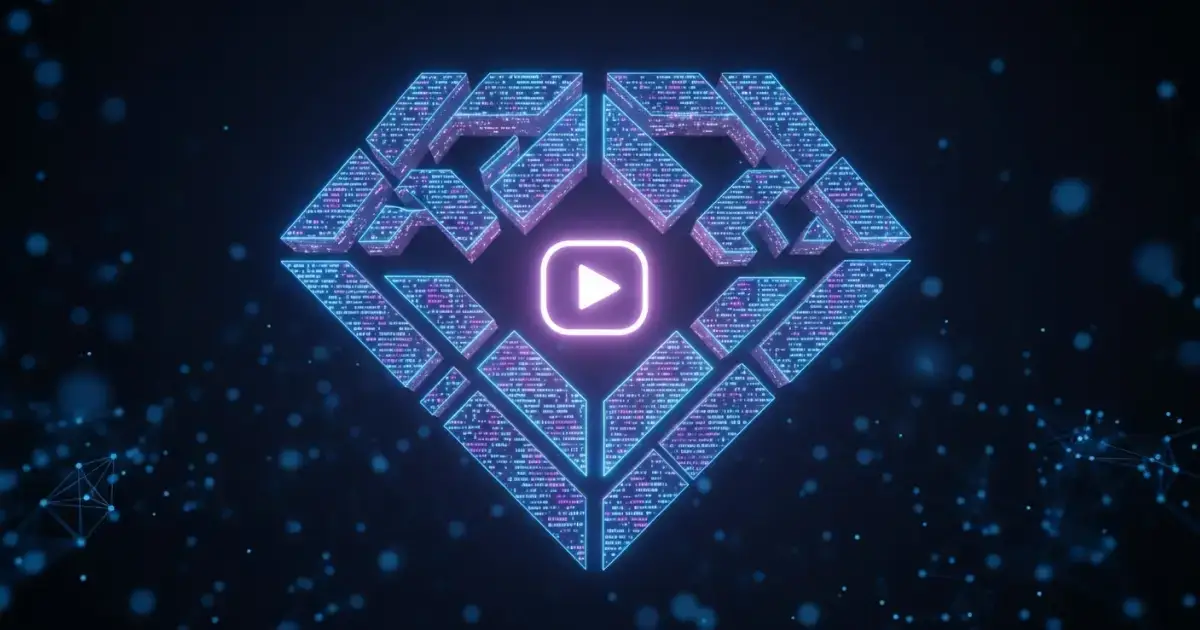
Smart contracts are the foundation of modern blockchain ecosystems. The concept of a smart contract refers to a self-executing agreement that is implemented as a computer program on blockchain technology. A smart contract is a computer program that can automatically execute an agreement when certain conditions are met. They enable developers to create decentralized applications, issue tokens, and establish systems that run without human intervention. Instead of relying on banks, brokers, or legal institutions, blockchain users can trust smart contracts to automatically execute transactions and enforce the terms of an agreement.
Ethereum has become the leading blockchain for smart contract development. Its robust infrastructure and thriving community have made it the platform of choice for building decentralized finance (DeFi) protocols, non-fungible tokens (NFTs), gaming systems, and more. Blockchain technology underpins the automation and trustless nature of smart contracts, providing decentralization, security, and transparency.
This beginner-friendly guide explains the basics of smart contracts, how they work, their benefits and limitations, and how Ethereum enables their use at scale. By the end, you will have a clear understanding of why smart contracts matter and how they are reshaping the digital economy.
What Are Smart Contracts?

Smart contracts are self-executing programs stored on a blockchain. A smart legal contract formalizes agreements between parties and can be automatically executed when predefined conditions are met. They contain predefined rules, written in code, that automatically enforce agreements once conditions are met.
For example, imagine you want to buy a piece of digital artwork. Instead of relying on a marketplace or escrow service, a smart contract enforces the agreement between the buyer and seller (the parties) and automatically executes the transfer of ownership to you as soon as your payment is received. This happens without human intervention, reducing delays and eliminating the risk of fraud.
How Smart Contracts Work
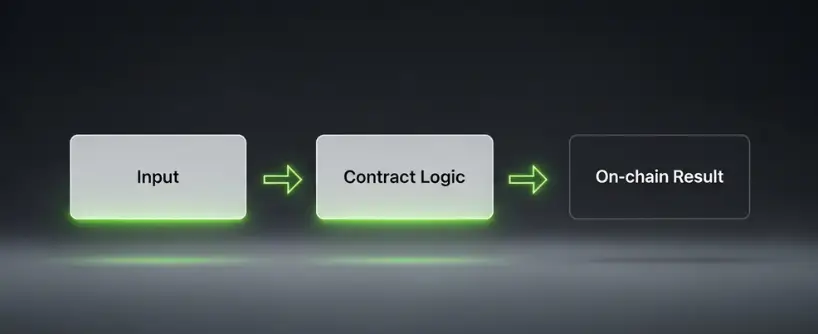
At their core, smart contracts follow an if/when…then model. The contract checks predetermined conditions, and if they are satisfied, it executes the action.
Example workflow:
- A developer writes the code in a programming language such as Solidity.
- The code is compiled into bytecode and deployed on the Ethereum blockchain.
- Once deployed, the contract receives a unique blockchain address.
- Users interact with the contract by sending transactions from one account to another, allowing the smart contract to handle transactions automatically.
- The contract verifies inputs and its code is executed when predetermined conditions are met.
- Results are recorded permanently on the blockchain.
Each transaction is processed and recorded in the next block on the blockchain.
This automation of processing transactions between accounts makes smart contracts reliable and predictable, removing the need for third-party enforcement.
Ethereum Smart Contracts

Ethereum was the first blockchain to introduce programmable smart contracts at scale. Its decentralized virtual machine, called the Ethereum Virtual Machine (EVM), executes contract code consistently across all network participants. The EVM is a completely isolated system, meaning it operates in a sandboxed environment with no access to external networks or filesystems, ensuring secure execution of smart contracts. Ethereum smart contracts can also interact with other smart contracts and other contracts within the ecosystem.
Why Ethereum Dominates
- Maturity: Ethereum has been operational since 2015 and hosts thousands of dApps.
- Standards: Popular token standards like ERC20, ERC721, and ERC1155 originated on Ethereum.
- Ecosystem: Development tools, libraries, and community resources are centered around Ethereum.
- Security: Ethereum’s large validator base makes it resilient to attacks.
Other blockchains also support smart contracts, and various blockchain platforms enable the development and deployment of smart contracts, providing foundational infrastructure for automating processes and ensuring transparency. However, Ethereum remains the most widely adopted platform, often setting industry standards.
Smart Contract Basics
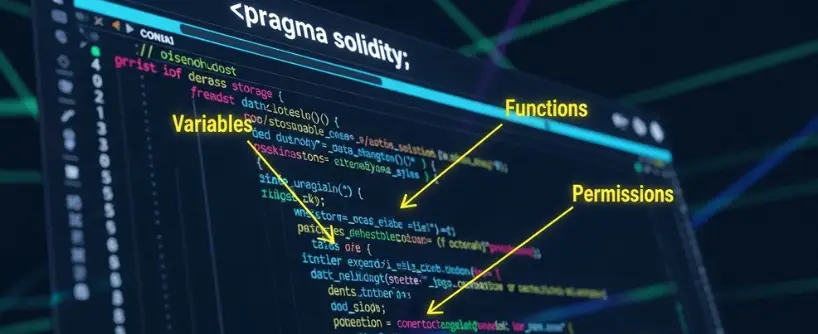
Written in Solidity
Solidity is Ethereum’s most popular programming language. Every Solidity contract begins with a pragma solidity directive to specify the compiler version. Variables in a contract can store and update value, and the contract’s code defines how these values are managed. It allows developers to define rules, manage permissions, and create reusable functions.
Immutable Code
Once a new contract is deployed, its code becomes immutable and cannot be altered, ensuring stability and trust. Some contracts use proxy patterns for upgrades, but immutability is the default.
Transparent Execution
Smart contract code and transactions are publicly visible on the blockchain. Each transaction is publicly visible, including the source account that initiated it. This transparency builds trust but also requires developers to code carefully, as flaws are equally visible.
Benefits of Smart Contracts
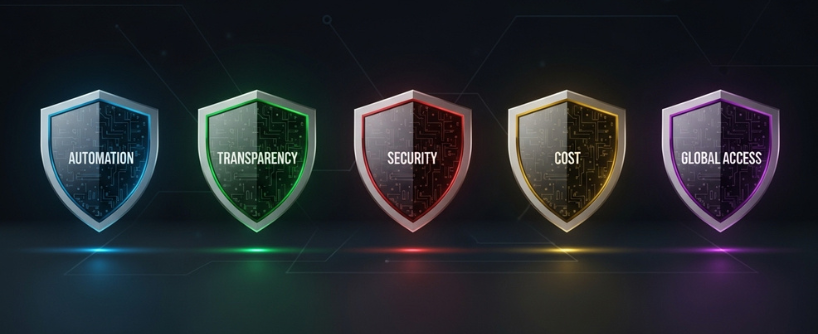
- Automation: Smart contracts automate tasks and business processes, allowing transactions and agreements to execute automatically without intermediaries. This improves efficiency for businesses across various industries.
- Transparency: Code and results are verifiable on the blockchain, making blockchain-based operations more trustworthy for businesses.
- Security: Immutable contracts reduce fraud and tampering, providing a secure foundation for business activities.
- Cost Savings: Removing intermediaries lowers fees. Automating payments and supply chain management are key benefits for blockchain-based businesses, streamlining financial transactions and enhancing operational efficiency.
- Global Access: Anyone with internet access can interact with them, enabling businesses worldwide to leverage these advantages.
Limitations of Smart Contracts
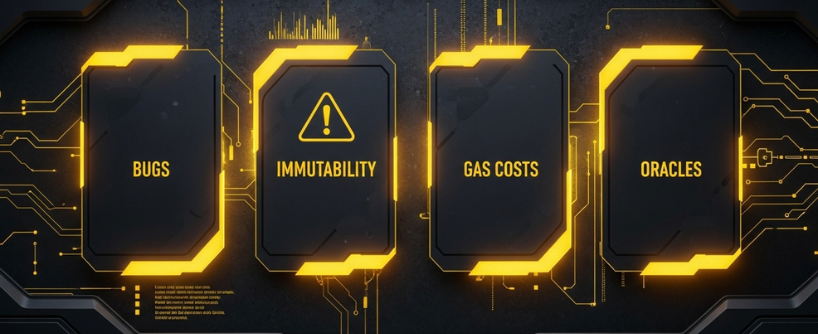
- Code Errors: Bugs can lead to catastrophic financial losses.
- Immutability Risks: Errors are hard to fix once deployed.
- Scalability Issues: High gas fees on Ethereum can limit adoption.
- Dependency on Oracles: Real-world data requires external sources.
Addressing these limitations is crucial to unlocking the full potential of smart contracts.
Real-World Applications of Smart Contracts

Decentralized Finance (DeFi)
DeFi is one of the biggest revolutions powered by smart contracts. Instead of relying on traditional banks, smart contracts handle lending, borrowing, trading, and savings automatically. For example, platforms like Aave and Compound allow users to deposit cryptocurrency into liquidity pools, where smart contracts then lend it out to borrowers. Interest rates are calculated in real time based on supply and demand, and both lenders and borrowers interact with the protocol without needing a middleman.
Smart contracts also power decentralized exchanges (DEXs) such as Uniswap. These platforms allow users to trade tokens directly from their wallets. Liquidity pools and automated market makers (AMMs) are governed by smart contracts, ensuring trades are executed fairly and instantly. By removing centralized intermediaries, DeFi smart contracts reduce fees, increase transparency, and give users more control over their funds.
Another major DeFi use case is yield farming, where users move assets across protocols to earn rewards. Smart contracts automate reward distribution, ensuring participants receive tokens proportional to their contributions. Without smart contracts, such complex systems would be impossible to run without trusted middlemen.
Non-Fungible Tokens (NFTs)
NFTs have transformed digital ownership, and smart contracts are at the core of their functionality. Each NFT is powered by an ERC721 or ERC1155 contract on Ethereum or compatible blockchains. These contracts store unique identifiers, ownership details, and links to metadata such as images or music files.
Marketplaces like OpenSea or Blur rely entirely on smart contracts to handle minting, transfers, and sales. When a buyer purchases an NFT, a smart contract verifies payment, transfers ownership, and updates the blockchain record permanently. This automation ensures that creators are paid royalties instantly, and buyers can trust the authenticity of their purchase.
NFTs go beyond art and collectibles. Ticketing systems now issue concert or event tickets as NFTs, preventing counterfeiting. Real estate companies are exploring tokenized property deeds using smart contracts to prove ownership. Even in gaming, NFTs represent unique skins or in-game items, providing players with true ownership of digital assets.
Gaming
Blockchain-based gaming has seen exponential growth thanks to smart contracts. Traditional games are controlled by centralized publishers, but blockchain games give players real ownership of in-game assets. Smart contracts issue fungible tokens for currencies and NFTs for rare items, skins, or weapons.
Games like Axie Infinity became famous for creating play-to-earn models, where players earn real-world value by participating. Smart contracts manage battles, distribute rewards, and record asset ownership. Without them, it would be impossible to maintain trust in decentralized gaming economies.
Another benefit of smart contracts in gaming is interoperability. An NFT sword earned in one blockchain game could potentially be used in another, thanks to shared standards. This creates entirely new ecosystems where players benefit from the value they generate. As Web3 gaming expands, smart contracts will remain its foundation.
Supply Chain
Supply chains are often plagued by inefficiencies and lack of transparency. Smart contracts offer solutions by automating processes such as product tracking, payments, and quality control. Enterprises can record each step of a product’s journey on the blockchain, ensuring authenticity and accountability.
For example, IBM’s Food Trust uses blockchain-based smart contracts to track food from farms to stores. If contamination is discovered, retailers can trace the exact source in seconds, preventing widespread recalls. Similarly, the diamond industry uses smart contracts to verify the origin of gems, ensuring they are conflict-free.
Smart contracts also improve international trade. Instead of relying on manual paperwork and multiple intermediaries, trade agreements can be encoded into blockchain contracts. Payments can be released automatically once shipping milestones are verified, reducing delays and cutting costs.
Insurance
Insurance is another industry where smart contracts are driving change. Traditional claims often involve delays, manual verification, and disputes. With smart contracts, payouts can be automated as soon as conditions are met.
For example, flight insurance powered by smart contracts automatically compensates travelers if a flight is delayed or canceled. Oracles provide real-time flight data to the blockchain, and once a delay is confirmed, the smart contract releases payment instantly, no paperwork required.
In agriculture, smart contracts linked to weather oracles can automate crop insurance. If rainfall falls below a threshold, payouts are triggered automatically. This reduces administrative costs for insurers and provides farmers with faster access to funds.
By reducing fraud, cutting overhead, and speeding up settlements, smart contracts make insurance more efficient and customer-friendly.
Smart Contract Code Example
pragma solidity ^0.8.0;
// This is a basic example of a smart contract.
contract SimpleStorage {
uint256 private data; // Stores a value
function set(uint256 x) public {
data = x; // Set the value
}
function get() public view returns (uint256) {
return data; // Retrieve the value
}
}This basic example demonstrates how a smart contract can store a value and allows users to set or retrieve that value. If a transaction runs out of gas at any point during execution, the operation is reverted and all state changes are undone. While basic, it shows the structure of Solidity code used in more complex systems.
Beginner Guide to Smart Contracts

- Learn Solidity: Begin with tutorials and Ethereum developer documentation.
- Use Testnets: Deploy contracts on test networks like Goerli or Sepolia.
- Experiment with Tools: Frameworks like Hardhat and Truffle simplify testing, and many features are already implemented in widely used libraries, making development easier.
- Follow Best Practices: Adopt libraries such as OpenZeppelin.
- Prioritize Security: Always test extensively and seek audits.
Security in Smart Contracts
Security is the most important factor in development. Unlike traditional systems that depend on a central authority for enforcement, smart contracts operate autonomously on the blockchain. This increases security by removing the need for a trusted intermediary, but also places full responsibility on the code itself. Common vulnerabilities include:
- Reentrancy Attacks: Exploiting repeated calls before state updates.
- Integer Overflows: Mathematical errors causing logic failures.
- Improper Access Control: Granting permissions too broadly.
Best Practices:
- Use libraries with audited code.
- Limit admin privileges.
- Employ multi-signature wallets for governance.
- Conduct multiple audits and bug bounties.
The Future of Smart Contracts
Ethereum continues to improve scalability with Layer 2 rollups, sharding, and Ethereum 2.0 upgrades. These improvements will lower gas fees and increase throughput.
Cross-chain compatibility will also grow, enabling smart contracts to interact across blockchains. Real-world asset tokenization, such as real estate and equities, is expected to be a major growth area.
Frequently Asked Questions
What are smart contracts in simple terms?
Smart contracts are computer programs that enforce agreements automatically. A vending machine is often used as an analogy: insert money, and it delivers your item without needing a cashier. On Ethereum, if you send tokens or Ether to a contract, it executes its rules such as transferring an NFT or releasing funds without delay. Smart contracts allow users to automate processes and enforce agreements without intermediaries. This makes transactions efficient, transparent, and trustless.
Why are smart contracts important in Ethereum?
Ethereum’s success is built on smart contracts. They transform Ethereum from a digital currency into a programmable platform. Through them, developers create DeFi platforms, NFT marketplaces, and DAOs. Without smart contracts, Ethereum would be limited to simple peer-to-peer transfers. They expand the blockchain’s utility, making Ethereum the most versatile network in the industry.
Can smart contracts be changed after deployment?
No, smart contracts are immutable. This protects users by ensuring that the rules cannot be changed unfairly after launch. However, immutability also introduces risks if there are coding mistakes. To address this, developers sometimes use proxy contracts that allow upgrades. While this provides flexibility, upgrades must be carefully managed to avoid undermining trust. When deploying a new contract, it creates a unique address and code on the blockchain, which cannot be altered after deployment.
Do smart contracts handle real-world data?
Not directly. They can only interact with blockchain data. To connect with external information, smart contracts use oracles. For example, a decentralized insurance product may need rainfall data from weather services. Oracles like Chainlink bridge this gap by delivering verified external data. This integration expands the scope of smart contract applications, allowing them to function in real-world contexts.
Are smart contracts safe?
They are only as safe as their code. While blockchain itself is secure, poorly written contracts can be exploited. Vulnerabilities like reentrancy have caused multi-million-dollar hacks. To improve safety, developers use audited libraries, run test suites, and hire external security auditors. For users, the safest approach is interacting only with contracts deployed by reputable teams.
Do all blockchains support smart contracts?
No. Some blockchains, such as Bitcoin, focus on transactions and offer limited scripting. Ethereum pioneered advanced smart contract functionality. Other platforms like Solana, Avalanche, and Polygon now support them as well. Each has unique programming languages and environments. Still, Ethereum leads in developer adoption, security, and ecosystem maturity.
How do smart contracts differ from traditional contracts?
Traditional contracts are enforced by legal systems, requiring trust in courts or arbitrators. Smart contracts are enforced by blockchain consensus, requiring no intermediaries. This means smart contracts are faster, cheaper, and more transparent. However, unlike legal contracts, they cannot interpret subjective situations. Their strength lies in automating objective conditions.
Do you need to be a programmer to use smart contracts?
No. End-users interact with smart contracts through dApps with user-friendly interfaces. For instance, when using Uniswap to swap tokens, you are interacting with a smart contract behind the scenes, but you don’t need to write code. Developers handle the programming, while users simply sign transactions with wallets like MetaMask.
Can smart contracts fail?
Yes. Smart contracts can fail due to bugs, gas limit issues, or exploits. Each transaction is allocated a certain amount of gas, which limits the computational resources it can consume. For example, if a developer forgets to restrict access, an attacker could gain control. Failed contracts may freeze funds or break dApps. This is why developers must prioritize audits, testing, and secure coding practices before deployment.
What skills are needed for smart contract development?
Developers need a solid understanding of Solidity and Ethereum’s architecture. Knowledge of programming fundamentals, especially JavaScript, helps with frameworks like Hardhat. Familiarity with blockchain security practices is essential, as even small mistakes can be costly. Experience with testing, deploying, and auditing smart contracts is also valuable for professional developers.
Glossary
Smart Contracts: Self-executing programs that enforce agreements without intermediaries.
Smart Legal Contracts: Legally binding agreements stored on the blockchain that automatically execute based on predefined conditions, providing legal guarantees and potential ramifications for non-compliance.
Blockchain Platforms: Foundational infrastructures, such as Ethereum, that enable the development and deployment of smart contracts, automating processes, ensuring transparency, and increasing efficiency across various applications.
Contract’s Code: The underlying code of a smart contract that defines its logic, execution, and lifecycle management features, including functions for termination or deactivation (e.g., selfdestruct).
Ethereum Virtual Machine (EVM): A decentralized runtime environment that executes smart contract code consistently across Ethereum nodes.
Solidity: The primary programming language for writing Ethereum smart contracts.
Gas Fees: Fees paid in Ether to execute transactions and functions on Ethereum. Costs fluctuate based on demand.
Oracles: Services that bring real-world data onto the blockchain for use in smart contracts.
Reentrancy Attack: A vulnerability where a malicious contract repeatedly calls a function before state updates, draining funds.
Decentralized Applications (dApps): Applications built on blockchain that use smart contracts as their backend. Examples include DeFi platforms and NFT marketplaces.
Audit: A professional review of smart contract code to detect vulnerabilities. Audits are essential for project trust and security.
Token Standards: Sets of rules defining token behavior, such as ERC20 for fungible tokens and ERC721 for NFTs.
Layer 2 Solutions: Scaling technologies that process transactions off-chain or in batches, reducing Ethereum’s costs and improving speed.
Proxy Contracts: Contracts that separate logic and data layers, allowing for upgrades without losing stored information.
MetaMask: A widely used Ethereum wallet that enables users to interact with smart contracts by signing transactions.
Bug Bounty Program: An initiative where developers reward community members for finding vulnerabilities in smart contract code.
Immutable Code: Smart contract code that cannot be changed after deployment, ensuring stability and trust.
DAO (Decentralized Autonomous Organization): An organization governed by smart contracts and token holders instead of centralized management.
Conclusion
Smart contracts are at the heart of Ethereum’s success. They enable decentralized finance, NFT ecosystems, blockchain gaming, and supply chain solutions. By automating agreements and transactions, they remove intermediaries and reduce costs while providing transparency and security.
For beginners, learning how smart contracts work is essential to understanding blockchain. With proper security practices, clear programming, and careful deployment, smart contracts have the potential to revolutionize industries. As Ethereum evolves with scalability upgrades and cross-chain compatibility, their role will only expand.
About Bitunix
Bitunix is one of the world’s fastest growing professional derivatives exchanges, trusted by over 3 million users across more than one hundred countries. Ranked among the top exchanges on major data aggregators, Bitunix processes billions in daily volume and offers a comprehensive suite of products including perpetual futures with high leverage, spot markets, and copy trading. Users can trade bitcoin and other major cryptocurrencies on the platform, taking advantage of advanced trading features. Known for its Ultra K line trading experience and responsive support, Bitunix provides a secure, transparent, and rewarding environment for both professional and everyday traders. Bitunix Academy adds structured lessons so you can build skills while you trade.
Bitunix Global Accounts
X | Telegram Announcements | Telegram Global | CoinMarketCap | Instagram | Facebook | LinkedIn | Reddit | Medium
Disclaimer: Trading digital assets involves risk and may result in the loss of capital. Always do your own research. Terms, conditions, and regional restrictions may apply.

